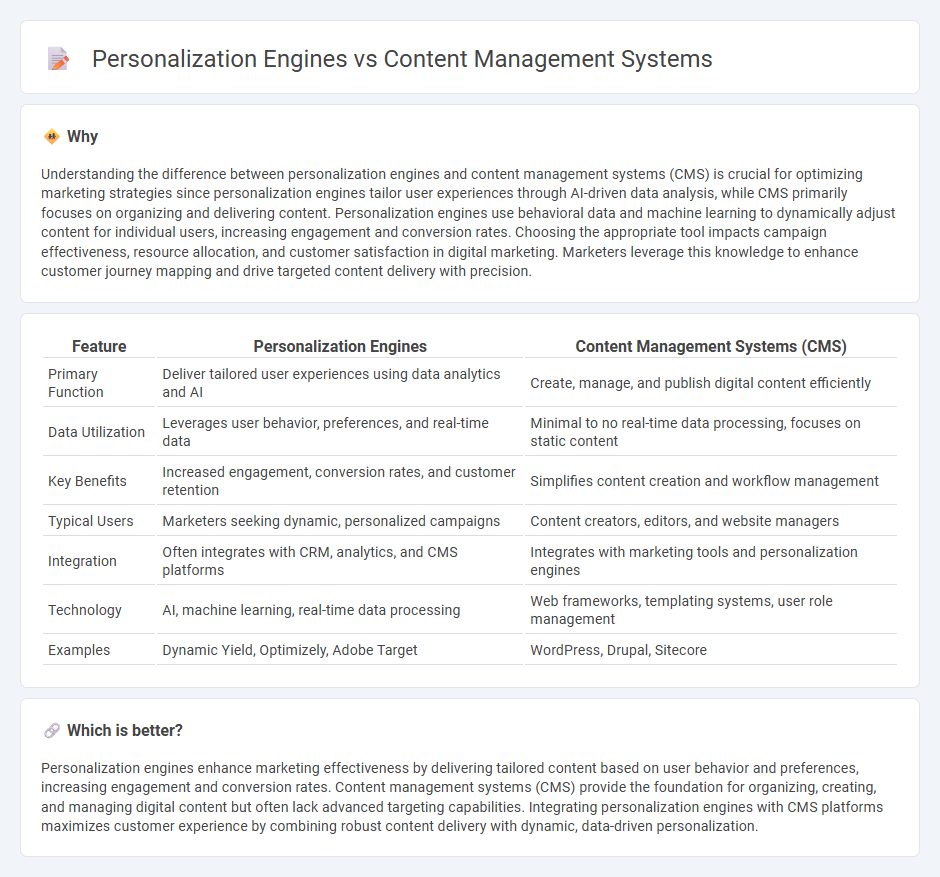
Personalization engines dynamically tailor marketing content to individual user preferences by leveraging data analytics and machine learning algorithms, enhancing customer engagement and conversion rates. Content management systems (CMS) primarily focus on organizing, creating, and distributing digital content efficiently across multiple channels, ensuring consistent brand messaging. Explore how integrating personalization engines with CMS can revolutionize your marketing strategy and boost ROI.
Why it is important
Understanding the difference between personalization engines and content management systems (CMS) is crucial for optimizing marketing strategies since personalization engines tailor user experiences through AI-driven data analysis, while CMS primarily focuses on organizing and delivering content. Personalization engines use behavioral data and machine learning to dynamically adjust content for individual users, increasing engagement and conversion rates. Choosing the appropriate tool impacts campaign effectiveness, resource allocation, and customer satisfaction in digital marketing. Marketers leverage this knowledge to enhance customer journey mapping and drive targeted content delivery with precision.
Comparison Table
| Feature | Personalization Engines | Content Management Systems (CMS) |
|---|---|---|
| Primary Function | Deliver tailored user experiences using data analytics and AI | Create, manage, and publish digital content efficiently |
| Data Utilization | Leverages user behavior, preferences, and real-time data | Minimal to no real-time data processing, focuses on static content |
| Key Benefits | Increased engagement, conversion rates, and customer retention | Simplifies content creation and workflow management |
| Typical Users | Marketers seeking dynamic, personalized campaigns | Content creators, editors, and website managers |
| Integration | Often integrates with CRM, analytics, and CMS platforms | Integrates with marketing tools and personalization engines |
| Technology | AI, machine learning, real-time data processing | Web frameworks, templating systems, user role management |
| Examples | Dynamic Yield, Optimizely, Adobe Target | WordPress, Drupal, Sitecore |
Which is better?
Personalization engines enhance marketing effectiveness by delivering tailored content based on user behavior and preferences, increasing engagement and conversion rates. Content management systems (CMS) provide the foundation for organizing, creating, and managing digital content but often lack advanced targeting capabilities. Integrating personalization engines with CMS platforms maximizes customer experience by combining robust content delivery with dynamic, data-driven personalization.
Connection
Personalization engines integrate with content management systems (CMS) by leveraging user data to dynamically tailor content, enhancing user engagement and conversion rates. These engines analyze behavior patterns and preferences, enabling CMS platforms to deliver targeted content in real-time across multiple channels. This synergy optimizes marketing strategies by ensuring relevant messaging aligns with individual customer journeys.
Key Terms
Content Delivery
Content management systems (CMS) organize and publish digital content efficiently, ensuring a consistent user experience across platforms. Personalization engines analyze user behavior and preferences to deliver customized content that increases engagement and conversion rates. Explore the differences and how each technology enhances content delivery strategies.
User Segmentation
User segmentation in content management systems (CMS) enables targeting based on predefined categories like demographics or behavior patterns, while personalization engines leverage real-time data and machine learning to dynamically tailor content for individual users. CMS typically manage segments through static rules, whereas personalization engines continuously analyze user interactions to refine segments and deliver more precise experiences. Explore the differences in depth to optimize your digital strategies through advanced user segmentation techniques.
Dynamic Personalization
Dynamic personalization leverages content management systems (CMS) by tailoring user experiences through real-time data integration and behavior tracking, enhancing engagement and conversion rates. Unlike traditional CMS, personalization engines deploy machine learning algorithms and predictive analytics to deliver individualized content, offers, and recommendations seamlessly. Explore how dynamic personalization transforms digital marketing strategies by visiting our comprehensive guide.
Source and External Links
What is a content management system (CMS)? - A CMS is software that enables creating, managing, and modifying digital content without coding expertise, offering collaboration, digital asset management, and multi-channel content delivery features for streamlined workflows and improved user experience.
What Is A Content Management System (CMS)? - A CMS provides a centralized platform to create, edit, organize, and publish content with role-based permissions, combining a front end for user interaction and a back end for content management, simplifying web content creation without technical overhead.
Content management system - A CMS is software that manages digital content creation and modification, typically comprising a content management application (front end) and content delivery application (back end), and can be installed on-premises or used as cloud-based solutions.
 dowidth.com
dowidth.com